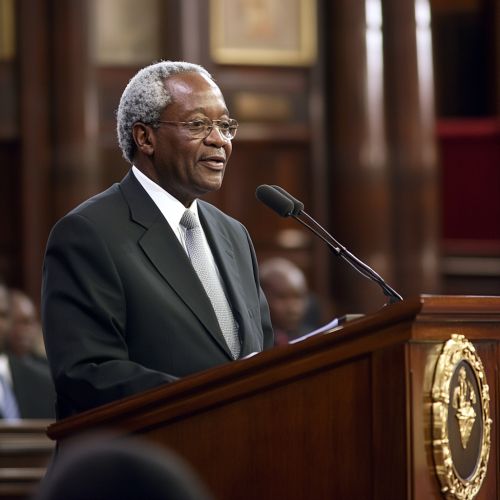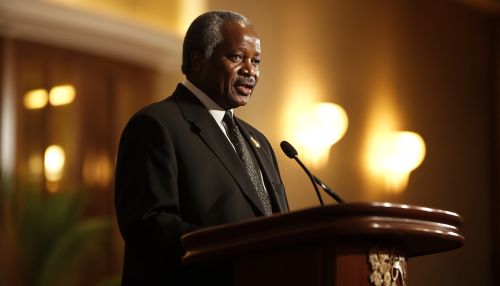Thabo Mbeki: Difference between revisions
(Created page with "== Early Life and Education == Thabo Mvuyelwa Mbeki was born on June 18, 1942, in Mbewuleni, a rural area in the Eastern Cape province of South Africa. He was the son of Govan Mbeki, a prominent anti-apartheid activist and member of the ANC, and Epainette Mbeki, a community activist. Growing up in a politically active family, Mbeki was exposed to the struggles against apartheid from a young age. His early education took place at home an...") |
No edit summary |
||
| Line 19: | Line 19: | ||
In 1994, following the first democratic elections in South Africa, Mbeki was appointed Deputy President under [[Nelson Mandela]]. During his tenure, Mbeki was responsible for overseeing the country's economic policy and played a significant role in the formulation of the [[Reconstruction and Development Programme|RDP]]. His focus on economic growth and development laid the groundwork for his future presidency. | In 1994, following the first democratic elections in South Africa, Mbeki was appointed Deputy President under [[Nelson Mandela]]. During his tenure, Mbeki was responsible for overseeing the country's economic policy and played a significant role in the formulation of the [[Reconstruction and Development Programme|RDP]]. His focus on economic growth and development laid the groundwork for his future presidency. | ||
[[Image:Detail-98497.jpg|thumb|center|Thabo Mbeki standing at a podium, delivering a speech in a formal setting.|class=only_on_mobile]] | |||
[[Image:Detail-98498.jpg|thumb|center|Thabo Mbeki standing at a podium, delivering a speech in a formal setting.|class=only_on_desktop]] | |||
== Presidency (1999-2008) == | == Presidency (1999-2008) == | ||
Latest revision as of 03:50, 18 October 2024
Early Life and Education
Thabo Mvuyelwa Mbeki was born on June 18, 1942, in Mbewuleni, a rural area in the Eastern Cape province of South Africa. He was the son of Govan Mbeki, a prominent anti-apartheid activist and member of the ANC, and Epainette Mbeki, a community activist. Growing up in a politically active family, Mbeki was exposed to the struggles against apartheid from a young age. His early education took place at home and at local schools, where he excelled academically.
Mbeki's formal education continued at Lovedale, a prestigious missionary school, where he was expelled for participating in a student strike. He later completed his schooling through correspondence courses. In 1962, Mbeki moved to the United Kingdom to study economics at the University of Sussex, where he earned both his bachelor's and master's degrees. His time in the UK was marked by his involvement in the ANC's international activities, as he worked to garner support for the anti-apartheid movement.
Political Career
Early Involvement
Mbeki's political career began in earnest when he joined the ANC Youth League at the age of 14. His commitment to the cause deepened during his time in the UK, where he was actively involved in the ANC's London office. In 1970, Mbeki relocated to Lusaka, Zambia, the headquarters of the ANC in exile, where he worked closely with Oliver Tambo, the then-president of the ANC.
Rise to Prominence
Throughout the 1970s and 1980s, Mbeki played a crucial role in the ANC's diplomatic efforts, traveling extensively to build international support against apartheid. His work in the ANC's Department of Information and Publicity helped shape the organization's global image. Mbeki's diplomatic skills and strategic thinking were instrumental in the ANC's negotiations with the South African government, leading to the eventual dismantling of apartheid.
Deputy Presidency
In 1994, following the first democratic elections in South Africa, Mbeki was appointed Deputy President under Nelson Mandela. During his tenure, Mbeki was responsible for overseeing the country's economic policy and played a significant role in the formulation of the RDP. His focus on economic growth and development laid the groundwork for his future presidency.


Presidency (1999-2008)
Economic Policies
Thabo Mbeki's presidency was characterized by a strong emphasis on economic reform and modernization. He implemented the GEAR strategy, which aimed to stimulate economic growth through fiscal discipline, trade liberalization, and privatization of state-owned enterprises. While these policies attracted foreign investment and stabilized the economy, they also faced criticism for not adequately addressing unemployment and poverty.
Mbeki's administration prioritized the development of infrastructure and technology, recognizing their importance in integrating South Africa into the global economy. His efforts to promote ICT were evident in initiatives like the establishment of the Presidential National Commission on Information Society and Development.
HIV/AIDS Controversy
One of the most contentious aspects of Mbeki's presidency was his stance on the HIV/AIDS epidemic. Mbeki questioned the link between HIV and AIDS, and his administration was criticized for its reluctance to provide antiretroviral treatment. This position led to significant public health challenges and sparked widespread criticism from both domestic and international communities.
Foreign Policy
Mbeki's foreign policy was marked by his vision of an "African Renaissance," which sought to promote peace, stability, and development across the continent. He played a pivotal role in the formation of the AU and the NEPAD, initiatives aimed at fostering economic cooperation and political integration among African nations.
Mbeki's diplomatic efforts extended to conflict resolution, where he was involved in mediating peace processes in countries such as Burundi, the DRC, and Sudan. His commitment to African unity and development earned him respect on the international stage, although some criticized his approach as being overly idealistic.
Post-Presidency
After resigning from the presidency in 2008, Mbeki continued to engage in diplomatic and academic pursuits. He established the Thabo Mbeki Foundation, which focuses on promoting African leadership and development. Mbeki has also been involved in various mediation efforts, including serving as a facilitator in the peace process in Sudan.
Mbeki's post-presidency has been characterized by his continued advocacy for African development and his critique of Western policies towards the continent. His writings and speeches often emphasize the need for African countries to assert their sovereignty and pursue development paths that align with their unique contexts.
Legacy and Criticism
Thabo Mbeki's legacy is a complex one, marked by significant achievements and notable controversies. His economic policies helped stabilize South Africa's economy and integrate it into the global market, but they also faced criticism for not adequately addressing social inequalities. Mbeki's vision of an African Renaissance and his contributions to continental diplomacy have been widely recognized, yet his handling of the HIV/AIDS crisis remains a significant blemish on his record.
Mbeki's intellectual approach to leadership, characterized by his emphasis on strategic thinking and long-term planning, has been both praised and critiqued. His presidency marked a departure from the charismatic leadership style of his predecessor, Nelson Mandela, and his technocratic approach has been seen as both a strength and a limitation.
